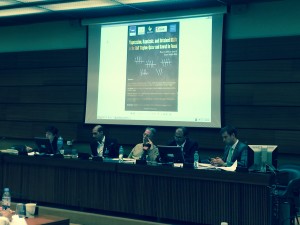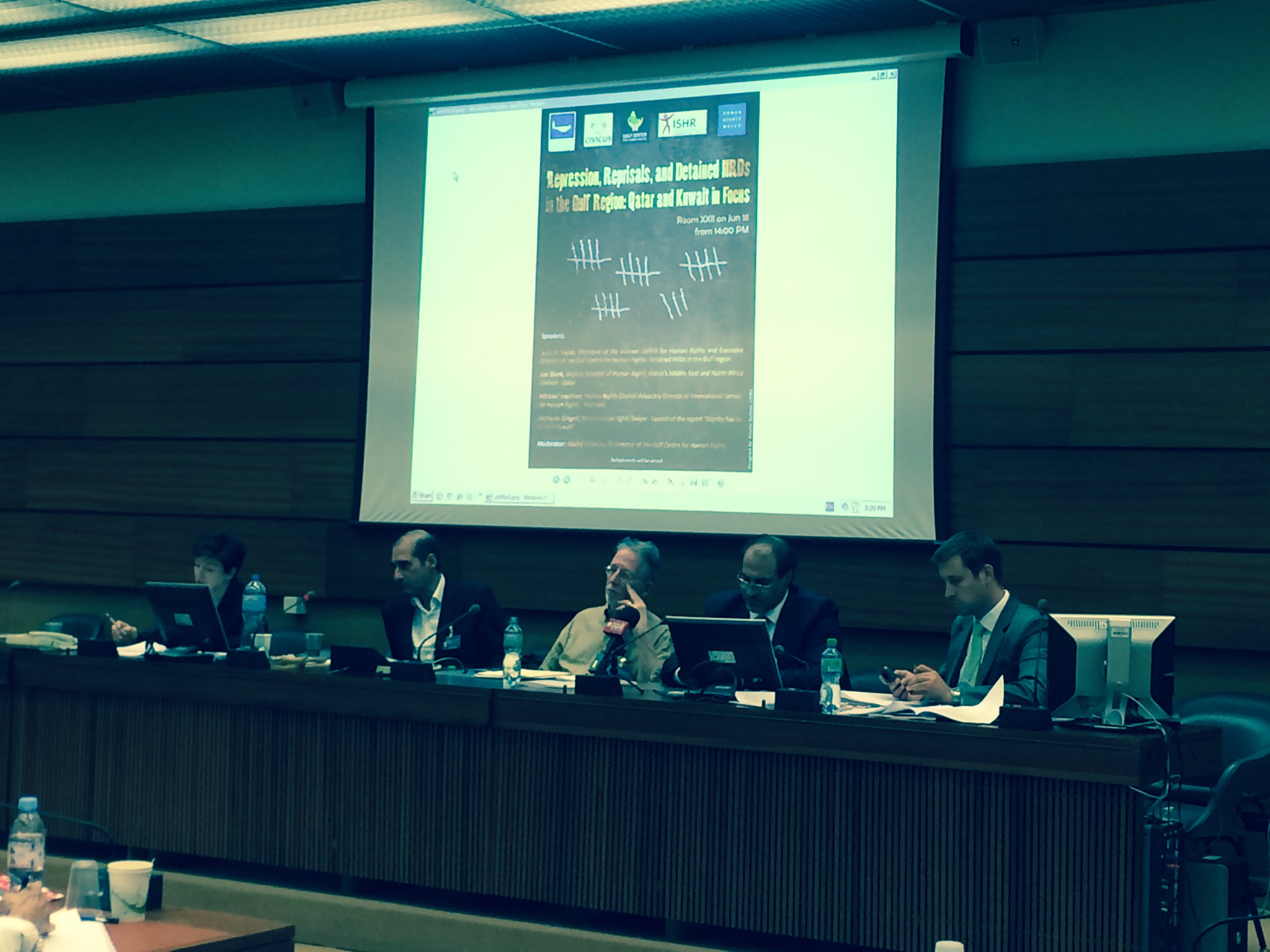 On Wednesday evening, June 18, 2014, the Cairo Institute for Human Rights Studies (CIHRS), in conjunction with the World Alliance for Citizen Participation (CIVICUS) , Human Rights Watch (HRW), the Gulf Center for Human Rights (GCHR), and International Service for Human Rights (ISHR), organized a side event in Geneva on the status of human rights in the Gulf and retaliation against human rights defenders in the region, with a special focus on Qatar and Kuwait.
On Wednesday evening, June 18, 2014, the Cairo Institute for Human Rights Studies (CIHRS), in conjunction with the World Alliance for Citizen Participation (CIVICUS) , Human Rights Watch (HRW), the Gulf Center for Human Rights (GCHR), and International Service for Human Rights (ISHR), organized a side event in Geneva on the status of human rights in the Gulf and retaliation against human rights defenders in the region, with a special focus on Qatar and Kuwait.
The side event, titled “Repression, Reprisals, and Detained HRDs in the Gulf Region: Kuwait and Qatar in focus”, was held during the 26th session of the UN Human Rights Council, which is convened in Geneva until June 27.
The side event hosted Joe Stork, Deputy Director of Human Rights Watch’s Middle East and North Africa division; Michael Ineichen, Human Rights Council Advocacy Director at International Service For Human Rights; Mellanie Gingell,a British Human Rights lawyer and member of the Gulf Center for Human Rights; and Mohammed al-Tajer, a Bahraini Human Rights lawyer and General Coordinator of the Bahrain Observatory for Human Rights. Khaled Ibrahim, the Co-director of the Gulf Center for Human Rights, chaired the side event.
Joe Stork focused on Qatar, discussing several issues, most importantly the grave violations of the rights of migrant workers, the way the authoritarianism of the government prevents the exposure of violations, and the absence of transparency and information about the situation in Qatar.
Stork also addressed Qatar’s problem with political favoritism and the clear double standards at work given the royal family’s monopolization of power. This is in addition to the rights violations faced specifically by women. The discussion also looked at the gap between the official Qatari government statements on human rights and the actual status of these rights in the country. Although Qatar has ratified several international conventions, local practices and laws contravene these charters, particularly laws regulating freedom of association and the right to form civic organizations and freedom of expression. Several stiff sentences have been issued for criticizing the royal family or threatening the public peace, and the NGO law in Qatar almost entirely confiscates the right for any civil, independent organizations to exist in the country. Referring to al-Jazeera, Stork said, “The channel is subordinate to the ruling family. That’s why it does not address Qatari affairs or spotlight human rights abuses in Qatar.”
Mohammed al-Tajer talked about his experience in detention in Bahrain, discussing how lawyers working with human rights violations and defending victims of abuses have been targeted since 2011. His arrest was followed by the arrest of more than five more lawyers, among them one who was arrested for a comment made on Twitter. Tajer also reviewed the cases of several rights activists in Bahrain who were sentenced to prison and other acts of retribution against them due to their interest in human rights issues. “The violations against me did not stop with my arrest,” al-Tajer said. “They included several other arbitrary and even degrading actions, such as videotaping me in my bedroom with my wife and blackmailing me by threatening to put the video online if I continued my human rights work.”
Lawyer Mellanie Gingell, emphasized the role played by the Gulf Center’s annual report, released in Geneva in March, in spotlighting abuses in the Gulf and the difficulties and sacrifices made by human rights defenders in the region. Gingell focused on Kuwait and a report on the country recently issued by the Gulf Center, which looks at freedom of expression and freedom of peaceful assembly. She noted the importance of raising awareness about the human rights in that country before Kuwait’s upcoming UPR.
Gingell pointed to several court sentences recently issued that clearly sought to exact retribution against individuals for exercising their right to express their opinions. These include Rashid al-Anzi (two years in prison), Sara Al Idris (20 months in prison), Hoda al-Ajami (11 years in prison), Hamad al-Naqi (ten years in prison), and Ayyad al-Harb (two years in prison).
Gingell also spoke about the Bidoun in Kuwait—stateless residents of Kuwait estimated to number more than 100,000—and the flagrant violation of their right to freedom of association and freedom of expression, as well as repeated prosecution for exercising their most basic rights.
Michael Ineichen spoke about the responsibility of the UN and its member states to protect human rights and human rights defenders in the Gulf, particularly those who cooperate with UN instruments in Kuwait and Qatar. Ineichen said that protecting rights activists in the Gulf should be a priority of human rights defenders working in the UN and the HRC, which can end these practices and prevent their recurrence. He said the problem is that the UN is unaware of these retaliatory acts as a result of the repression of activists in the Gulf. He therefore stressed the importance of building the capacities of human rights defenders and training them to engage with UN instruments, especially in Kuwait and Qatar.
Ineichen also presented a set of recommendations to the UN regarding the repeated repression, retaliation, and arrest of human rights defenders in the Gulf, particularly Qatar and Kuwait. These include working to build the capacities of human rights defenders in the region and improve their engagement skills with UN instruments, coordinating better responses from the UN, and strengthening the role of special procedures and the HRC.
Khaled Ibrahim emphasized the importance of raising awareness of violations against human rights and their defenders in the Gulf area in general, particularly in light of ongoing attacks on human rights defenders in Saudi Arabia and the UAE and governments’ willingness to impose all manner of impediment to prevent contact between rights activists in the Gulf and the international community or other human rights defenders in the region. These measures include travel bans and other actions that limit the role of civil society and undermine any opportunity for rights activists in the Gulf to form national or international groups in defense of human rights.
Share this Post

